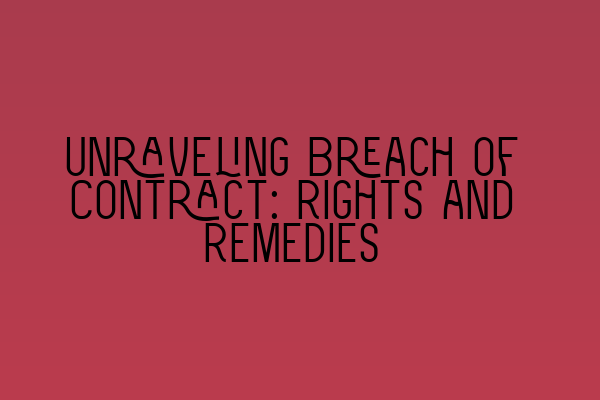Unraveling Breach of Contract: Rights and Remedies
In the realm of contract law, breach of contract is a common occurrence that can have significant legal consequences. Whether you’re a business owner, a freelancer, or an individual entering into a contractual agreement, understanding your rights and remedies in the event of a breach is crucial. This article aims to unravel the complexities of breach of contract, providing you with valuable insights into the legal landscape and guiding you through the remedies available to you.
First and foremost, let’s define breach of contract. A breach occurs when one party fails to fulfill their obligations as outlined in a legally binding agreement. It can manifest in various forms, such as non-payment, non-performance, or even interference with the other party’s ability to perform. When a breach occurs, the innocent party is left in a vulnerable position, seeking relief and compensation.
Now, let’s explore the rights and remedies available to the innocent party. It’s essential to review the terms of the contract thoroughly, as they may specify specific remedies in case of breach. Additionally, the law provides general remedies that can be pursued in the absence of contractual provisions.
One common remedy is known as damages. Damages aim to compensate the innocent party for the losses suffered as a result of the breach. There are various types of damages, including compensatory, consequential, and punitive damages. Compensatory damages seek to put the innocent party in the position they would have been if the breach had not occurred, while consequential damages cover the indirect losses stemming from the breach. Punitive damages, on the other hand, are awarded to punish the breaching party for their misconduct.
Further, there are specific performance and injunctions as alternative remedies. Specific performance is an equitable remedy in which a court orders the breaching party to fulfill their contractual obligations as agreed upon. This remedy is often used when the subject matter of the contract is unique or when damages would be an inadequate remedy. On the other hand, injunctions are court orders that prohibit the breaching party from engaging in certain actions. They are commonly sought to prevent further harm or to enforce specific terms of the contract.
In some cases, the innocent party may opt for rescission or termination of the contract. Rescission allows the parties to essentially undo the contract, returning to their pre-contract positions. Termination, on the other hand, brings the contract to an end, releasing both parties from their obligations. However, it’s vital to consider any potential liabilities or consequences that may arise from the termination of the agreement.
As with any legal matter, it’s advisable to seek professional legal advice when dealing with a breach of contract. Consulting with an experienced solicitor can help you navigate the intricate legal process and optimize your chances of obtaining a favorable outcome. They can analyze the specific nuances of your case, apply the relevant legislation, and guide you through the most appropriate course of action.
In conclusion, breach of contract is a complex issue that can have significant implications for all parties involved. Understanding your rights and remedies is crucial in safeguarding your interests and seeking redress. From pursuing damages to exploring alternative remedies like specific performance and injunctions, there are various paths to consider. Remember to thoroughly review your contract, seek legal advice, and act promptly to protect your rights. By doing so, you can navigate the challenges of breach of contract and strive for a fair resolution.
If you’re looking to prepare for the SQE exams, consider exploring related articles and resources to enhance your knowledge and chances of success:
1. SQE 1 Practice Exam Questions: Test your knowledge and familiarize yourself with the structure and content of the SQE 1 exams through practice quizzes.
2. SQE 1 Practice Mocks FLK1 FLK2: Sharpen your skills and gain confidence by engaging in mock exams specifically tailored for the SQE 1 exams.
3. SQE 2 Preparation Courses: Explore comprehensive preparation courses designed to equip you with the knowledge and skills necessary to excel in the SQE 2 exams.
4. SQE 1 Preparation Courses: Enhance your understanding and grasp of the key concepts and principles tested in the SQE 1 exams through specialized courses.
5. SRA SQE Exam Dates: Stay informed about the upcoming SQE exam dates to plan your preparation effectively and ensure timely registration.
Remember, preparation is key to success in the legal profession and the SQE exams. Best of luck in your endeavors!
